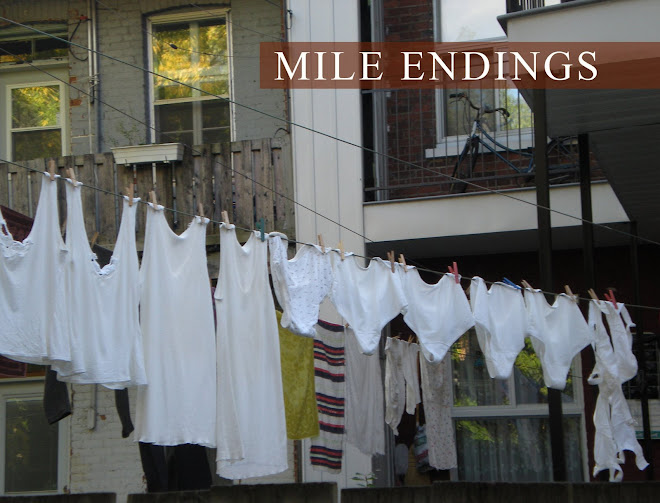
I notice Nick Dordas because he glows. At his spot in the window of the dry-cleaners, the lamp next to his sewing machine lights up his face and hands and his sharp white shirt. With his combed-back silver hair and crisp attire he looks almost too perfect to be real. He could be a tailor in a movie shoot, or part of somebody's art project.
Nick Dordas is his own work of art. In a neighbourhood where it's hard to find someone who's not wearing jeans, he wears a fitted shirt, a buttoned vest, dress pants, and a tie.
"I like to dress," says the tailor, who is 69, and the owner of 100 neckties. "I take off the tie when I sleep. I don't like jeans." He frowns at a pair on the counter in front of him. "I wear jeans when I go to the village in Greece. In the city, never!"

I am wearing jeans and a T-shirt, as I do every day, and while we talk I notice threads unraveling from my top. Next to Dordas it's hard not to feel like a slob. The only casual aspect of his appearance is the measuring tape draped around his neck. He pulls a length of it down to the counter, marks the offending jeans, and chalks the hemline with a yardstick.
His actions are meticulous, he is a jeans surgeon. It rings true when he says that as a boy in Tripoli, Greece, he chose tailoring over carpentry, shoemaking or painting because he wanted to stay clean. At 13, he went to Athens to work at a tailor's in the big city. "If you don't love it, you don't learn. I love it. I know everything. " He snips off extra material from the legs of the jeans, then sews a perfect hem.

When I give him my ripped jacket, in a couple minutes Dordas fixes the torn pocket and also sews up other holes he has located under the arm. He disposes of each frayed edge and ripped seam with the energetic intolerance of a perfectionist.
James Bitzilios hired him to do alterations at the shop a year and a half ago, after Dordas closed the garment factory he'd run for over 30 years. "I come here to pass my time," Dordas says. "What am I going to do at home. Wash dishes? I didn't want to retire. I'm not tired!"
He has a wife, grown children and grandchildren who go to Greek school. Plus, he says he knows half the Greeks in Montreal. Clearly, all this is not enough. Dordas needs to be sewing. He comes in at 7:30 in the morning, drinks a coffee, opens up the shop and gets to work.
 "For him, it's like playing golf is for me," Bitzilios says. "You can tell he loves what he does."
"For him, it's like playing golf is for me," Bitzilios says. "You can tell he loves what he does."Bitzilios says having Dordas in the window is good for business. People stop and stare, take his picture and then ask about alterations. Dordas is the siren, luring in passersby, with his Old World style and spellbinding fastidiousness.
"Everybody passes by, they wave," Dordas says. "Sometimes, they pass and..." he puts his fingers to his lips to mimic people's appreciation for his work.
 At around three o'clock, after darning someone's holey wool sweater, Dordas announces, "Finished."
At around three o'clock, after darning someone's holey wool sweater, Dordas announces, "Finished."It's mid-afternoon. Jeans, pants, skirts and jackets lie in a large heap, waiting for his attention.
"For tomorrow, I have only this," he says with a hint of regret, as if the big pile is not much at all, as if it's not nearly enough.
 Dordas uses this method every day. Before it gets too late, Dordas stops sewing, making sure to leave himself something to do in the morning. You can tell it's an effort. If he weren't careful, he might just give into temptation and breeze through the mountain of clothes in a flash.
Dordas uses this method every day. Before it gets too late, Dordas stops sewing, making sure to leave himself something to do in the morning. You can tell it's an effort. If he weren't careful, he might just give into temptation and breeze through the mountain of clothes in a flash.Renew Système
251 Bernard Ouest
Montreal
This profile also appears in the mysterious paper Le Bathyscaphe #4.




3 comments:
Wonderful portrait! I wish I could take my hemming and mending to him!
So vivid and lovely and charming.
God bless
Post a Comment